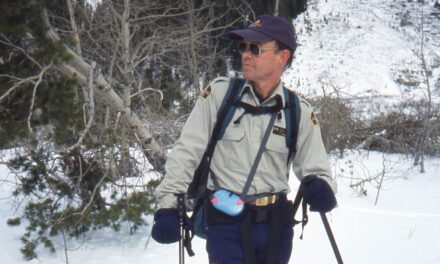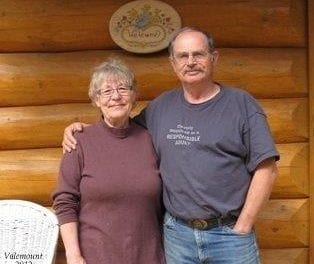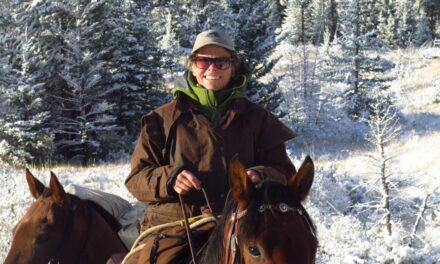This Oral History interview was funded in part by a research grant received in 2022 from the Government of Alberta.
Park Warden Alumni Society of Alberta
Oral History Phase 12 Fall 2022
Phone Interview with Mike Dillon
Date/time: November 25, 2022 @ 1300
Interviewed by Monique Hunkeler
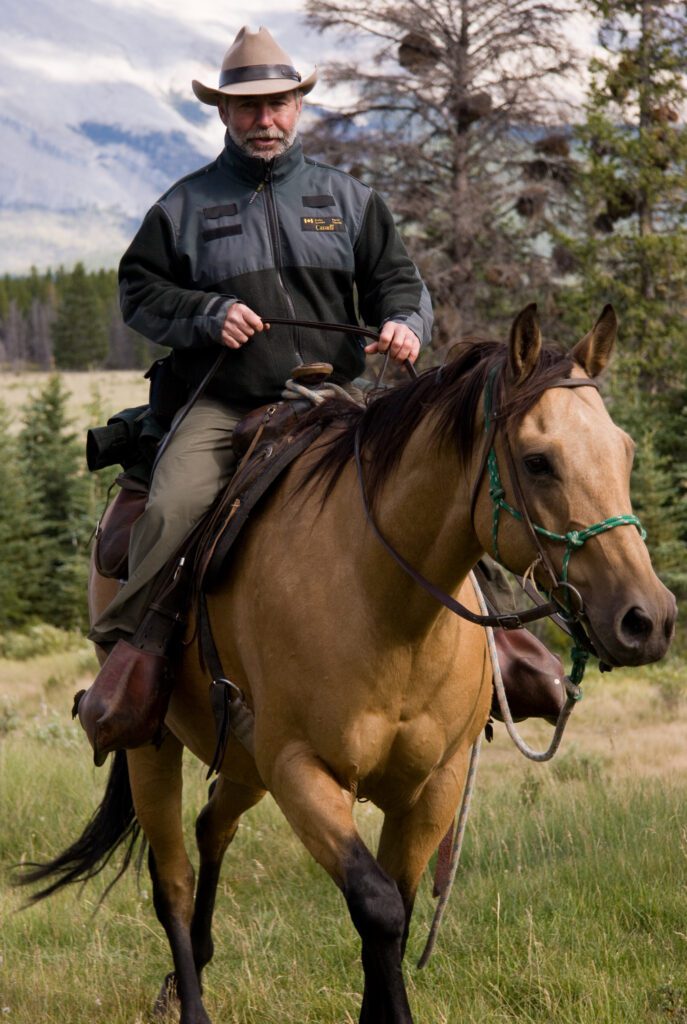
Mike on Dillon Centennial Ride 2009 photo by John Niddrie
Place and date of birth? I was born in Hamilton, Ontario in 1956
MH: Where did you grow up? I lived some of my early years in Hamilton, Toronto, and Morrisburg until I was 10. And then from 10 years of age on until 19 I lived in the Ottawa – Hull area.
MH: How did you become involved in the Warden Service? Which national park did you start working in?
MD: I was taking Physical Education at the University of Ottawa, and I just wanted to come out west to look for work the summer of 1978. I got a job up at the Miette Hot Springs at the Bungalows, right next to the hot pool, and I saw that the folks at the pool were making more money and having a lot of fun. And so, a couple years later, I ended up applying for a job at the government pool and I started with Parks Canada in 1980, at Miette Hot Springs as a locker room attendant. And then the summer of 1981, I moved to Miette Campground as campground maintenance and in the summers of 1982/1983, I was the campground supervisor at Miette Hot Springs (the previous campground supervisor had been Alan Dibb and he had just left to join the Warden Service.) Alan was telling me what it was like working as a Warden, and I thought that looked pretty good. But I worked another year (1983) as Supervisor of Pocahontas campground. And then finally in 1984 half way through the summer, I got on as a patrolman with the Warden Service in Jasper. In 1984/1985 I was a patrolman in Jasper and in order to get on with the Warden Service, I had to go back to school, so in 1984, I went to Lethbridge Community College and when I graduated, I got my first seasonal Warden position in Elk Island National Park.
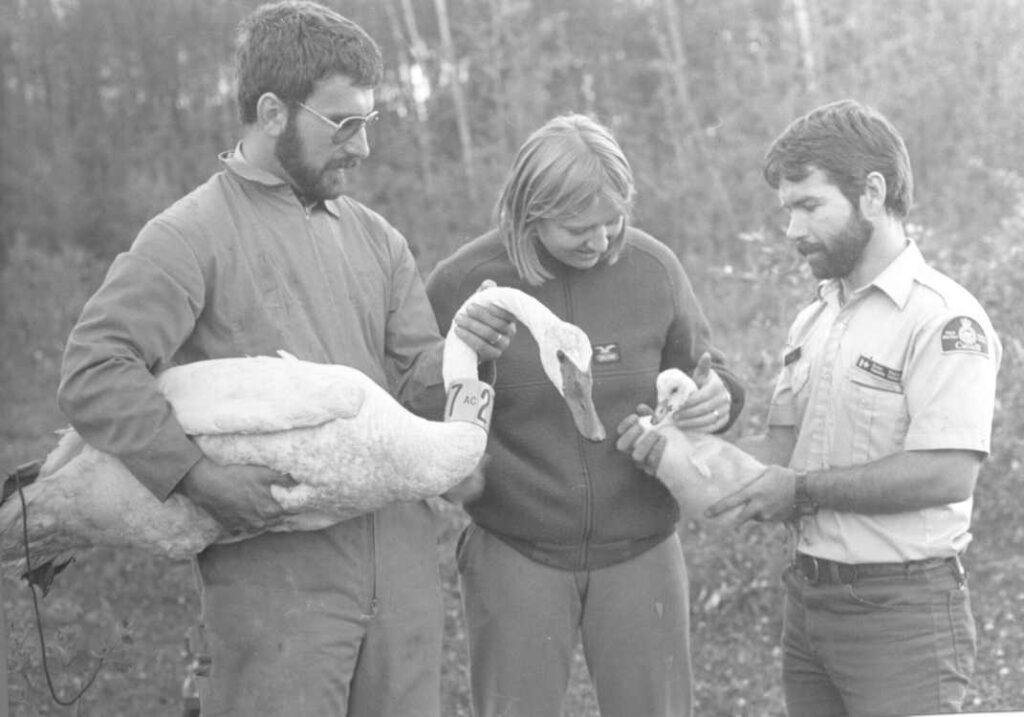
Trumpeter Swan Reintroduction Elk Island National Park Terry and Ursula Winkler and Mike
MH: What made you want to join the Warden Service?
MD: Working up at the Hot Springs Campground, Wardens from Pocahontas station, (Gordon Antoniuk, Murray Hindle, Rod Wallace and Ivan Phillips) would come up to the campground and they would action problem wildlife and law enforcement and I’d see them riding off into the Fiddle Valley on horses, and I thought, “this looks like a pretty good lifestyle and you get paid to do all that stuff.” So that’s when I decided to switch from outdoor education to resource management and went to Lethbridge in order to qualify to get on with the Warden Service.
MH: What different parks did you work in? How did they compare? Do you have a favourite?
MD: I worked for about two and a half years at Elk Island then came back to Jasper as a Seasonal Warden. In January of 1991, I picked up a position in Waterton Lakes National Park from January to March 31. That was quite enjoyable and a different park, a nice park that doesn’t have a Trans-Canada Highway and the Trans Canada railway going through it so it’s a real destination park for people who just want to be there for the park.
After that winter, I still had my seasonal position in Jasper and I ended up coming back to Jasper where I stayed for the rest of my career.
Well, Jasper is obviously my favorite because I kept coming back to it and staying there. I had some choices to go to other parks at different times. Elk Island was a real wildlife management Park, which is really interesting. We did bison handling and elk trapping. When I worked there, we had a program to try to reduce the moose population because it’s a park that’s entirely fenced and has no major predators, or at least had no major predators at the time I was there. There was really nothing to control the Ungulate population other than disease. They had slaughters in Elk Island National Park several years before I was there but, obviously that didn’t go over well and wasn’t appropriate. So one of the projects I worked on was a way of reducing the moose population. We had moose traps, and we would trap moose, load them into a horse trailer and take them down to the Blackfoot grazing reserve which was an area where hunting was allowed. And another method was a birth control program where we would inject a drug called estrumate into pregnant cow moose. It would cause them to abort early in their pregnancy. It was a trial program. I don’t think it worked really well that way. We also established some jump fences so that moose could jump out of the south part of the park into the Blackfoot grazing reserve. In the summertime, there was a lot of beaver management and waterfowl work that went on there too. It was a lot of fun and I enjoyed my time there but I missed the mountains and kayaking and rock climbing and that sort of thing, which you couldn’t do in Elk Island.
MH: What were some of your main responsibilities over the years?
MD: When I started as a patrolman I worked with another patrolman (Alfie Creighton and then Kevin Bell). We pushed a measuring wheel and dragged a 100 metre tape measure around several trails in the park. We had to fill out a form for every 100 m. of trail. The concept was that the forms could be given to contractors who would bid on trail maintenance work. When I came back to Jasper from Elk Island I worked in Operations for quite a few seasons. And when I returned from the winter in Waterton, I got my first backcountry posting in the Brazeau District. And I worked for two seasons as the Seasonal Brazeau District Warden and then there was a competition for Backcountry Coordinator positions in Banff, Jasper, Yoho and Kootenay and I ended up placing first on the competition. I actually jumped from a seasonal GT2 to a supervising GT4 coordinator and I chose Jasper as the Park that I wanted to stay in as the backcountry coordinator. So I did that for about five years, and then that position came off the org chart, I think in all of the parks, and my reasonable job offer was the Operations Coordinator in the front country of Jasper. I had worked quite a bit as a seasonal in the operations section so I was pretty familiar with everything that was going on there. It was a little strange as I ended up becoming a supervisor for some of the permanent Wardens who had supervised me when I was a seasonal, but they were really good guys to work with so it wasn’t a big issue. I did that for about five years and then the hand gun issue and all of the kerfuffle with the law enforcement came up, and I asked if I could step back for a couple of years and work with Wes Bradford in the Human Wildlife Conflict shop. I went back to an acting GT3 position, keeping my substantive GT4. And that was a really, really interesting time as well. Human/wildlife conflict was part of Operations so we were always involved with some wildlife work but weren’t involved with it quite as heavily as when I worked with Wes. It was kind of a two-man job at that time and it was on a two-year rotation assignment with the idea of getting a bunch of the permanent Wardens experienced in all of the wildlife conflict issues and procedures, so that you had four or five people that were pretty qualified to immobilize wildlife or trap or do that sort of thing. Rick Ralf and Wes had worked together for quite a few years, maybe six or seven years, and that’s when the Chief Park Warden decided that maybe Rick should move to something else and we rotate some people through the Human/Wildlife Conflict shop. I did my two years’ rotation through the shop, which was a really interesting time. At the same time, I was still in operations and doing all the normal operational things as well. And then I moved into the Cultural Resource Specialist position when Rod Wallace moved on. I didn’t really want to stay in Operations. They were still going through a lot of the issues with the law enforcement and guns. We were in law enforcement and then out of law enforcement, training with shotguns for law enforcement and then not training with shotguns. It was a very strange time because bureaucrats and politicians had no concept of appropriate firearms. So the cultural position looked pretty good! Rod Wallace was just moving out of it and it was at my substantial level. At that time, in those earlier days, the cultural resource position still helped out in Operations a whole lot. I did regular duty shifts and some night shifts and helped out in the other functions. It was a good transition from Operations to getting away from the law enforcement issue. I was in that position for about 13 years before I retired. It was kind of a nice little world because almost nobody cared about cultural resources so they kind of left me alone. It was really interesting to work with a lot of different groups and people. Everything from archaeologists to indigenous people, so it was a rewarding time, and I enjoyed it and I was glad I had a chance to do that type of work.
MH: What did you like / Dislike about being a warden?
MD: It’s hard to believe that you got paid to do some of the things you got paid to do. I mean, ride horses or drive a jet boat, hang underneath a helicopter while circling Mount Robson, driving a snowmobile or being in the backcountry listening to wolves howling, or carrying an elk calf, immobilizing grizzly bears. Just sharing some of nature’s secrets that not many people get paid to do. Also living in the wilderness and being closely in touch with your environment. For me, as well, having ceremonial sweats with indigenous elders or powder skiing or ski touring, rescuing ducks from a fireplace or an outhouse, or hiking through an alpine meadow or climbing a mountain or canoeing a river. I mean, what’s not to like about the position? You know, not everything was good, for example human fatalities, both visitors and co-workers and wildlife fatalities, having to dispatch (put down) animals. Some of those things weren’t the nice part of the job.
MD: Dislikes: One of the things I really didn’t like was paperwork and so I tried to avoid it whenever possible.
MH: What were some of your more memorable events as a Warden?
MD: Well, some of the major memorable events were Pat Sheehan’s and Mike Wynn’s fatal accidents.
When I worked in the backcountry, there was an old trapper back there named Trapper Bill and he was pretty memorable.
There was fatal bear mauling in the Tonquin Valley that I was involved with. The David Thompson Bicentennial winter trip to Athabasca Pass was definitely memorable.
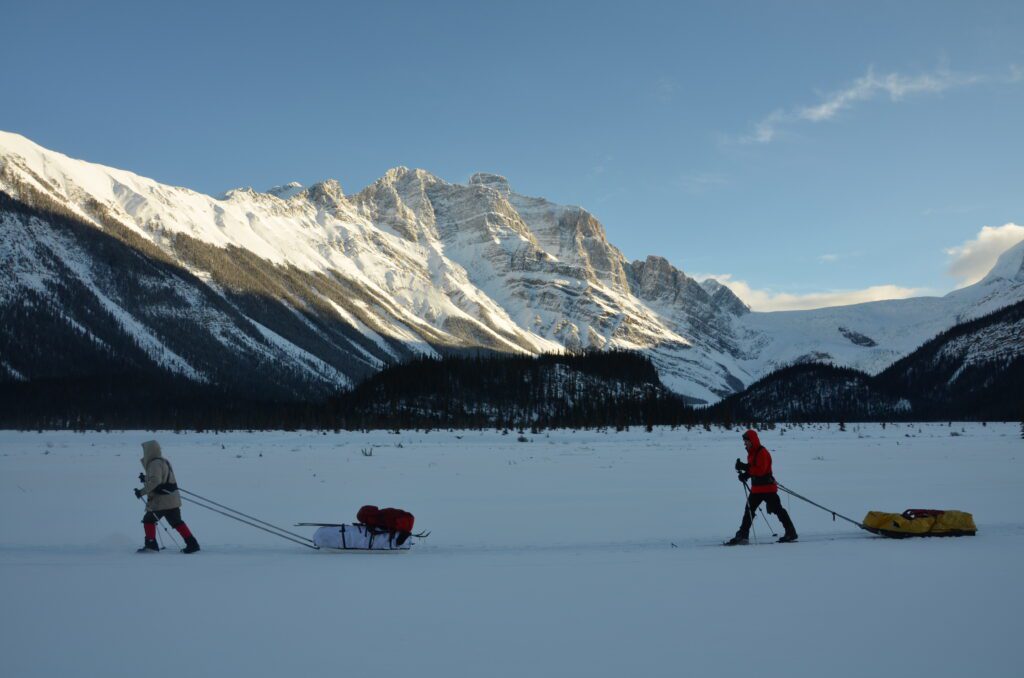
Mike and Ed Struzick on Scott Gravel Flats, returning from Athabasca Pass photo by Greg Horne
I worked on some projects with the foothills Model Forest grizzly bear research program, which was really interesting as well.
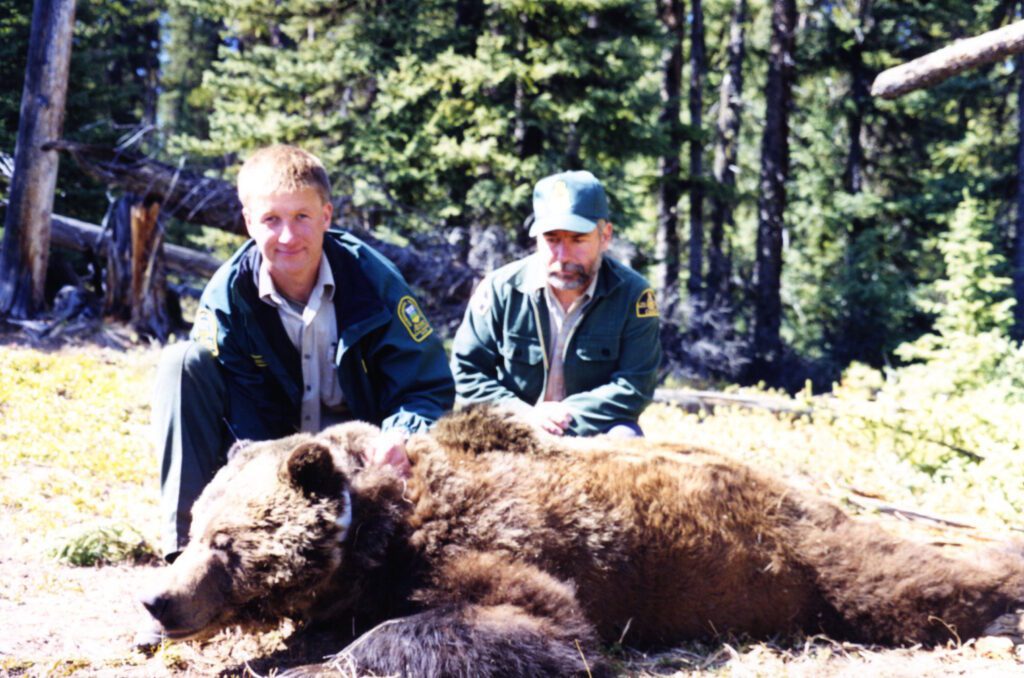
Grizzly Bear Research Project with Mike Ewald Fish&Wildlfe and Mike
